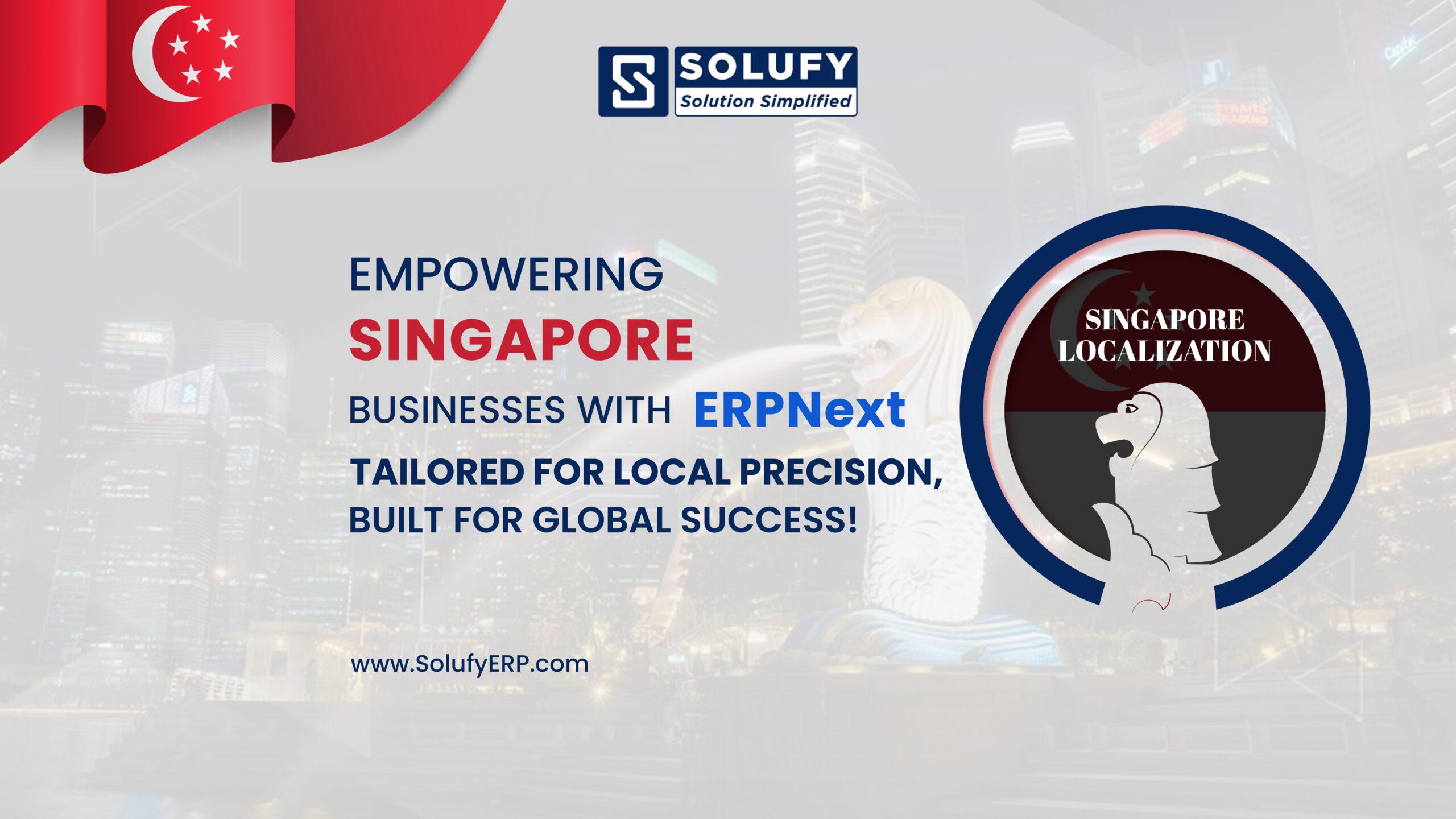In the fast-growing business world, every organisation requires a very effective and location-based HR system that can handle the workforce efficiently. A strong ERP platform like ERPNext provides its customers with a very efficient, all-inclusive HR module that can also be customised according to the specific needs of different regions. For organisations based in Singapore, localisation of the HR module from ERPNext would help the companies to get streamlined and compliance-ready with the relevant labour laws of Singapore.
Singapore Employee Profile
Employee is one of the most evident modules in the HR area of ERPNext. This module allows incorporating all details of employees at one platform. Ranging from simple data like name, designation, and department to detailed information like work information and contact number, the HR module ensures that all records of employees are organised and accessible.
Work Information Tab : It tracks the employee’s job, department and many more employment-type details.
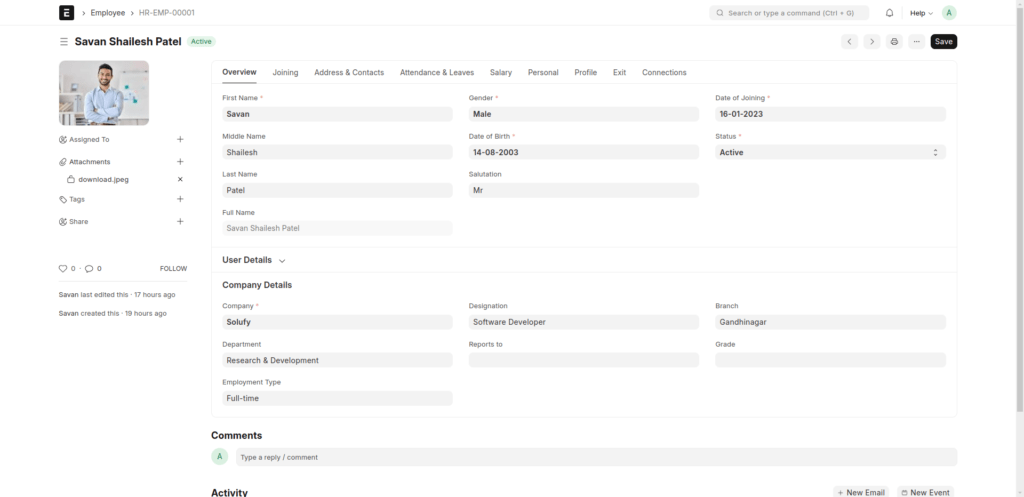
Contact Information Tab: It contains information about an employee’s phone numbers, emails, and even acts as a source of emergency contact.
Emergency Contact Section: For the purpose of any emergency, the list of employee’s emergency contacts is available at all times.
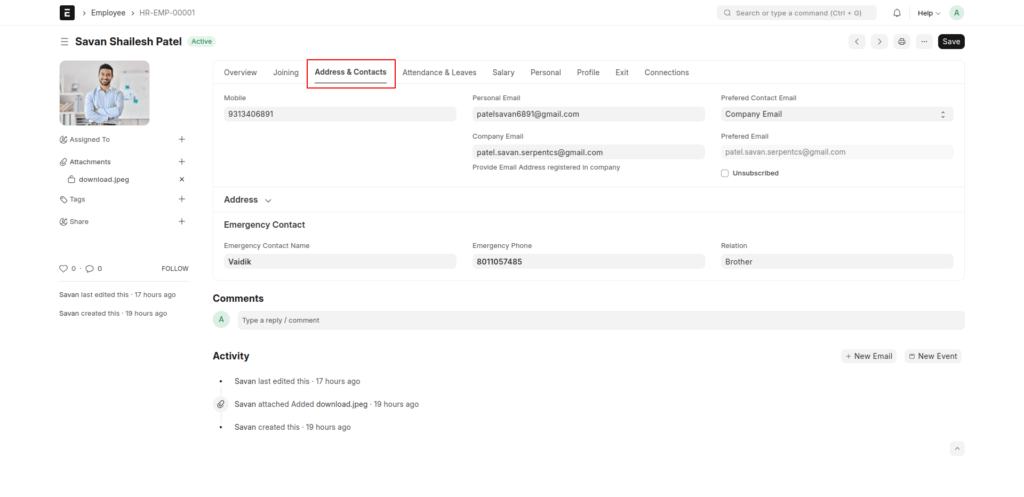
Approvers Tab : Enables setting up an approval flow for leaves, expense claims, and much more to follow while dealing with an employee.
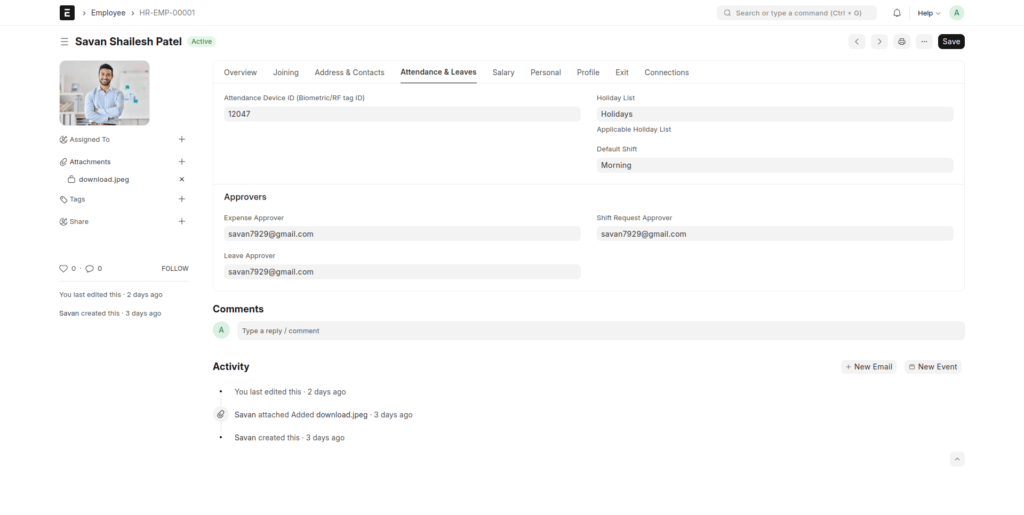
Joining Tab: Keeps track of the date of joining an employee along with all the other important joining details.
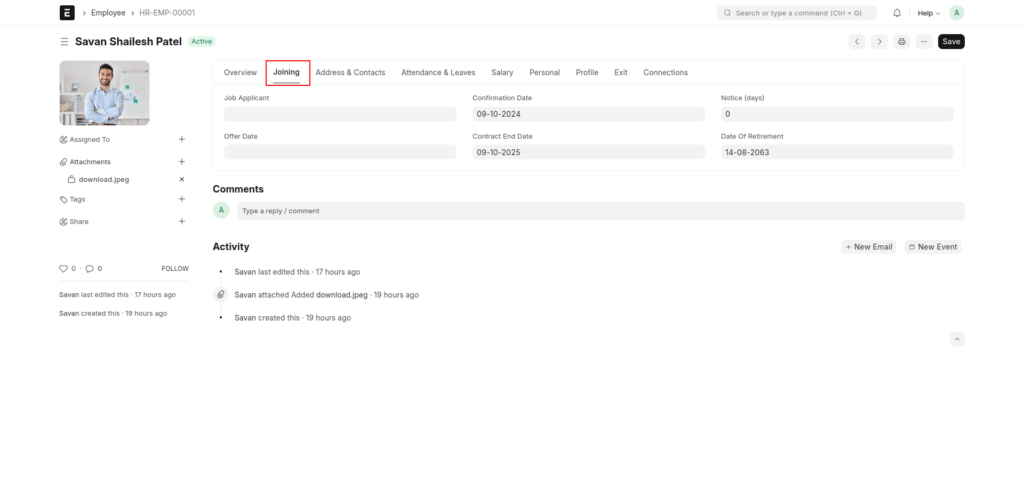
Address & Contacts Tab : Always holds information regarding the employee’s address and contact details, saving communication very much easier.
Personal Information and Benefits
The Personal Information tab takes in the details of the employee, such as emergency contacts, salary details, and bank account information. The HR module assures that such data in Singapore is kept private and under tight data protection law; therefore the module offers to store such data and retrieve it easily as long as needed.
Salary Tab: It displays an employee’s salary structure, from base pay to any allowance or deduction made and It stores the employee’s account details for the processing of salaries.
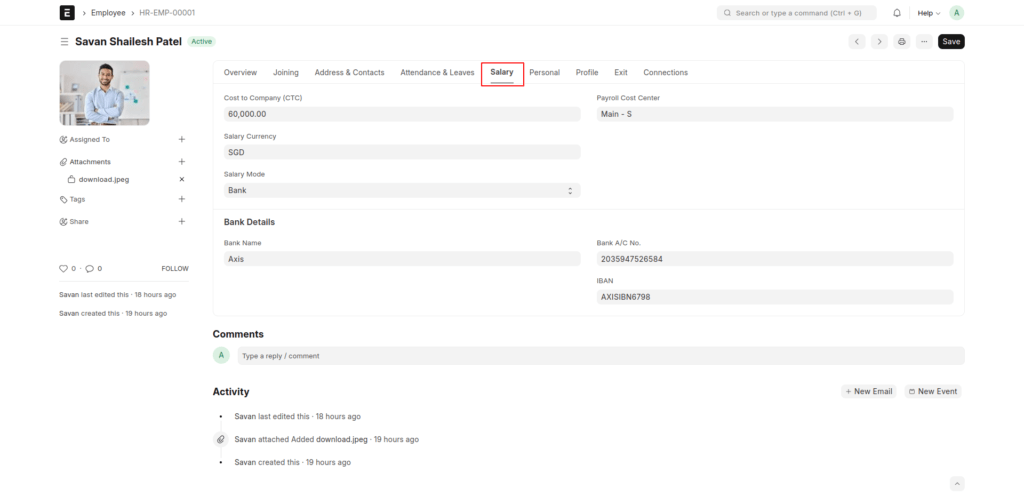
Singapore Payroll and Salary Management
Payroll management of ERPNext has been designed to manage complex salary structure, deductions, and the benefits, considering the Singaporean regulatory bodies’ requirements.
Salary Components Tab: Describes the various components of an employee’s salary base, allowances, and its possible deductions.
Pay Grade: You can customize to include all different pay grades and pay structures in your organization. It also automates the calculation of salaries, bonuses, and commissions
Earnings & Deductions: You can customize the earning structure with a variety of allowances such as transport, housing, etc. You can also add statutory deduction including CPF and Income Tax
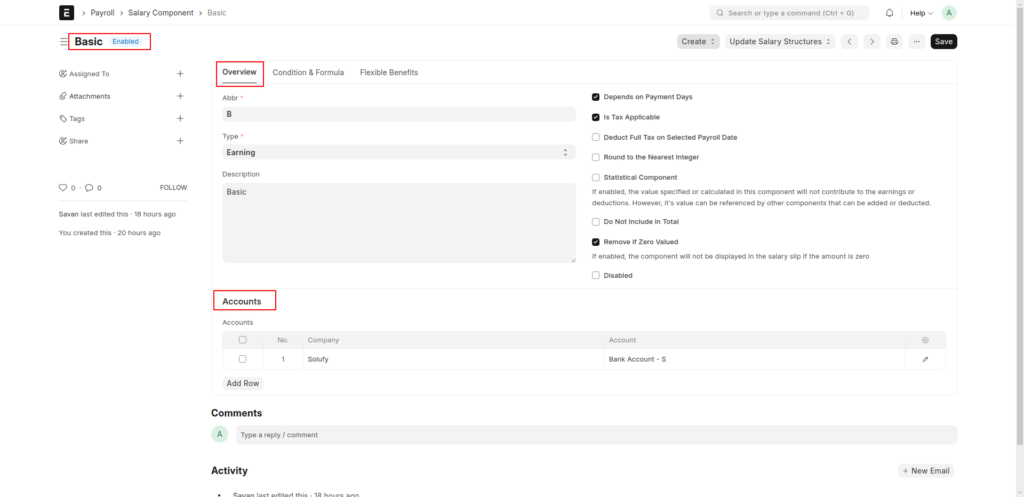
Income Tax and CPF Contributions
Singapore has a defined tax and social security structure. ERPNext’s Singapore localization computes income tax automatically along with contributions, both for employees and employers.
Income Tax Slab (Year 2024): The system is ready to show the latest slabs applicable for income tax in Singapore, complying with the existing laws that are applicable for tax.
CPF Contributions: ERPNext incorporates CPF contribution, which is employee and employer contributions calculated on the salary of the employee and other requirements in compliance with Singapore government norms .
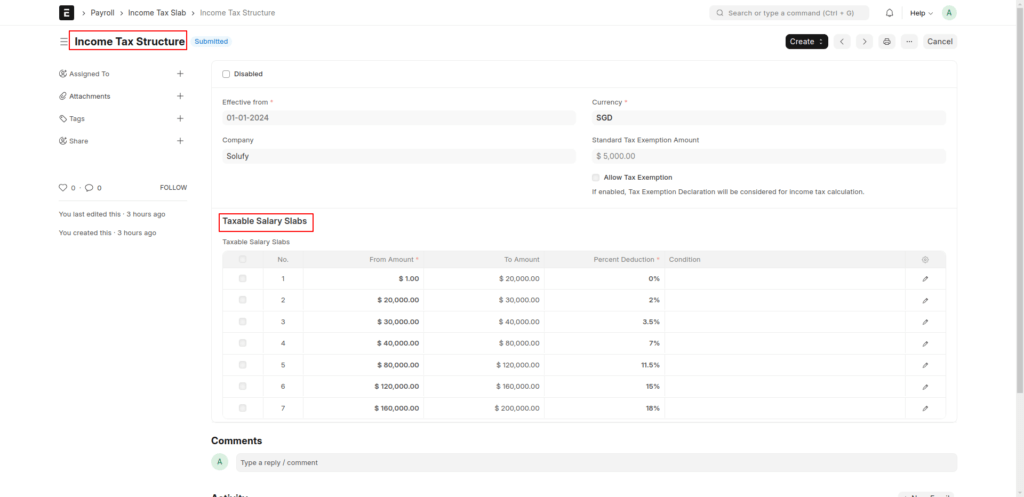
Singapore HRMS & Payroll Reports:-
- Singapore Appendix8a Report :- This report is used to declare employee earnings and tax deductions, including salaries, bonuses, and benefits-in-kind. It is submitted annually to the Inland Revenue Authority of Singapore (IRAS) to ensure compliance with tax regulations.
- Singapore Appendix8b Report :- The Appendix 8b report focuses on benefits-in-kind provided to employees, such as housing, transportation, and interest-free loans. It helps employers declare these non-monetary benefits to IRAS for accurate taxation
- Singapore HR Reports :- HR reports in Singapore track employee information, including demographics, leave records, performance metrics, and payroll data. These reports help ensure compliance with employment laws and support workforce planning.
- Singapore Income Tax report :- This report documents an individual’s or company’s taxable income, deductions, tax reliefs, and tax payable. Submitted annually to IRAS, it ensures proper income tax computation and filing.
- Singapore CPF OW AW :- This report outlines employee wages for CPF contributions, separating Ordinary Wages (OW) from Additional Wages (AW). It ensures contributions are calculated correctly based on CPF guidelines for salaries and bonuses.
- Singapore CIMB Bank Report :- The CIMB Bank report provides account details, transaction histories, and loan summaries. It is essential for financial tracking, audits, and budgeting purposes.
- Singapore CITI BANK Report :- This report details financial transactions, including account activities and credit card statements from Citibank. It is crucial for managing finances and ensuring reconciliation accuracy.
- Singapore – DBS Bank Giro :- This report covers direct debit and credit transactions via the DBS GIRO system. It is commonly used for recurring payments, such as salaries or utility bills.
- Singapore – Expense Maxcap :- This report tracks capped expense claims or allowances, ensuring that expenditures remain within set limits. It aids in budget monitoring and compliance with company or regulatory policies.
- Singapore YTD Payslip Report :- The Year-to-Date (YTD) payslip report summarizes an employee’s total earnings, deductions, and CPF contributions up to a specific date. It is useful for tax reporting and personal record-keeping.
- SG IR21 Report :- The IR21 report is used for tax clearance when employees cease employment or leave Singapore. Employers must submit this form to IRAS at least one month before the employee’s departure, detailing final income and taxes withheld.
- Singapore NRIC Verification :- This report verifies the authenticity of an individual’s National Registration Identity Card (NRIC). It is often used for identity verification in employment, banking, and official documentation processes.
- Singapore OCBC Report :- The OCBC Bank report provides detailed financial records, including account transactions and loan summaries. It supports personal or corporate financial analysis and compliance.
- SG Letter Undertaking Report :- A Letter of Undertaking report formalizes agreements outlining responsibilities and obligations, such as confidentiality terms, repayment commitments, or compliance assurances.
Exit Management
Managing employee exits is one very important action, whether it is through resignation or termination, for recording compliance and documentation. ERPNext’s Exit Tab monitors the same to ensure everything that needs to be done, including exit interviews, final settlements, and clearance processes, are carried out well.
Exit Tab: All the processes of an exit-from submission of resignation to final clearance and documentation-are tracked through this feature.
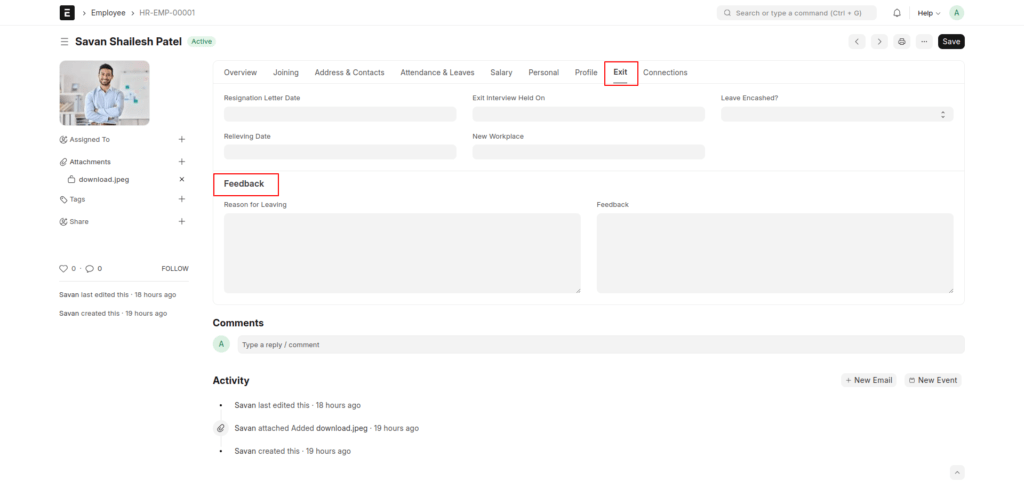
Conclusion
The HR module offered by ERPNext is comprehensive and can easily be localised for the Singapore businesses and would ensure that they remain compliant with all local regulations. From employee management and payroll to leave tracking and performance evaluations, all aspects of HR operations are streamlined through the HR module of ERPNext so that businesses can spend time on what really matters-growth and employee satisfaction.
Whether it is a small startup or an enterprise, ERPNext offers flexibility and scalability to meet its needs in HR, while staying updated about the changing labour laws in Singapore and taxation policies. The localised HR system in ERPNext for organisations saves time, reduces error rates, and thus improves overall productivity with ease and efficiency of HR workflow.
📩 Book Your Demo and Learn More! : https://www.solufyerp.com/contact-us/

